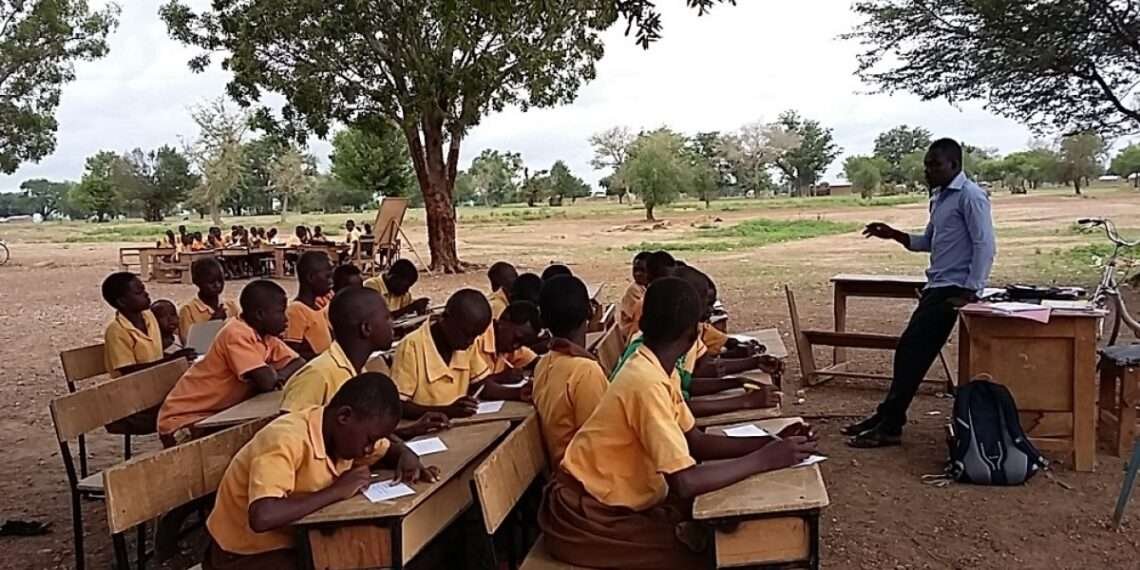A group of Civil Service Organization (CSOs) have expressed the need for government to increase the budgetary allocation to education from the current 12% to at least 15% of the total national budget.
According to the group, Ghana has been implementing the Free Compulsory Universal Basic Education (FCUBE) policy since 2005, with the aim of ensuring all citizens of basic school-going age enroll and complete basic school with relevant learning outcomes without financial barriers.
However, they noted that eighteen years into the implementation of FCUBE, there still exist significant access and quality deficits in the delivery of basic education, the drivers of which impact negatively on the work of teachers and learning outcomes.
The CSOs revealed that per the Ghana Statistical Service, 1 million children aged 4-18 are not in school – representing about 10 per cent of the age cohort. This, it explained, is primarily due to the lack of public basic schools in underserved communities, even as the population increases.
Furthermore, it indicated that at least 2,000 new basic schools are required to absorb the out-of-school children into formal basic schools. However, given the current rate of constructing new schools, this may take the next 10 years to accomplish
“The government must increase the budgetary allocation to education from the current 12 per cent to at least 15 per cent of the total national budget, using the supplementary budget window, and prioritize the disbursement of allocated discretionary education budget to increase the low budget execution to at least hundred percent by the end of the current financial year.”
Civil Service Organizations
Furthermore, the CSO’s noted that the anticipated budgetary increment which amounts to over GHC 4.3 billion, should as a matter of urgency and necessity be allocated to augment the hugely underfunded basic education goods and services budgets, and construct about 5,000 schools existing under trees, sheds, and dilapidated structures.
The CSOs which include STAR-Ghana Foundation Action Aid, Africa Education Watch, Ghana CSOs Platform on SDGs, CAMFED, GNAT, GNECC, and CCT World Vision further revealed that the government must develop an emergency infrastructure expansion plan for overcrowded urban and peri-urban schools.
Addressing challenges within Ghana’s basic education
The CSOs highlighted that the Plan must also include a purposive approach to bridging the 25 per cent gap between primary and JHS while providing new schools for underserved communities.
“The government must deploy desks to all the 2.3 million pupils in underserved schools. Partnerships with the Forestry Commission and the private sector should be pursued. The government must discontinue the plan to procure laptops for SHS and ensure that basic schools have the full complement of textbooks.”
Civil Service Organizations
As part its efforts to address challenges within the education, the CSOs recommended that the government must immediately procure textbooks and workbooks in all relevant subjects for all basic school pupils. Instead, they were of the opinion that government must re-introduce the supply of free exercise books to all public basic schools.
“The government must diversify the financing source for the Capitation Grant to include the Annual Budget Funding Amount, which is more reliable, while benchmarking its annual increment with annual inflation data. The government must disburse approved funds for financing arrears and the current cost of feeding in special schools and under the Ghana School Feeding programme. Additional allocations must be made in the 2023 supplementary budget to augment the inadequacies.”
Civil Service Organizations
Moreover, the CSOs emphasized that the government must depoliticize the recruitment of teachers by removing MPs from the
recruitment process and implement the long advocated and recommended 20% allowance for teachers in deprived areas.
Also, it stated that the government must put the secondary education strategy on hold until consultations with teachers and civil society organizations have been held to inform its review and release all arrears on the Capitation Grant to end the imposition of various forms of fees on pupils.
In their view, the Grant must be increased to absorb the cost of utilities, with automatic annual adjustments instituted in line with inflationary trends.
READ ALSO: Minority Demands Details On Gov’t ‘One Student One Laptop’ Policy





















